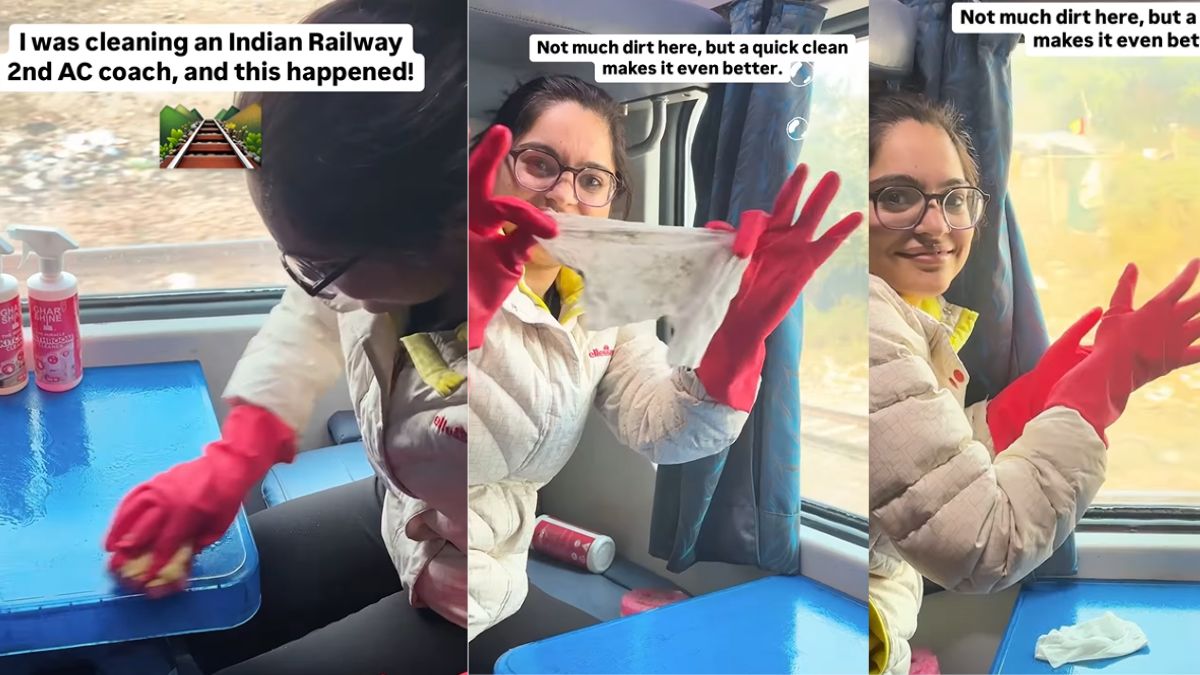Woman's Act of Cleaning on Indian Train Sparks Debate: Should Passengers Clean?
In a world obsessed with going viral, one woman's simple act of cleaning her train berth has ignited a firestorm of debate on social media. A short video, showcasing a woman meticulously cleaning her train compartment, has amassed millions of views, sparking a heated discussion about passenger responsibility and the role of Indian Railways in maintaining cleanliness. Prepare to be shocked – is this the surprising truth behind train cleanliness?
The Viral Cleaning Video: A Spark in the Indian Railways Cleanliness Debate
Priya Sharma, a content creator on Instagram, shared a video of herself cleaning her 2nd AC train berth. Armed with a spray bottle and a cleaning brush, she tackled dust, grime, and anything else that stood in her way. The video, captioned "Small actions matter," immediately took social media by storm, racking up millions of views within days. But not everyone applauded this spontaneous act of tidiness. What was the public's reaction? Why did this video cause such a stir?
Mixed Reactions and Divided Opinions
While some praised Priya for her commitment to cleanliness, others were quick to point out that maintaining the cleanliness of public spaces like trains is the responsibility of Indian Railways. This is an ongoing issue of debate. Arguments focused on taxpayers' money – users asserted that their tax payments already cover the cleaning services. It became a discussion on how public spaces are to be maintained: who cleans the train, and if passengers should take up cleaning. Many users discussed other countries’ public transit systems, such as those in Japan, where cleanliness is maintained effectively.
The Heart of the Matter: Passenger Responsibility vs. Railways' Duty
The video highlighted a critical issue in the debate surrounding public spaces in India and the expectation around passenger behavior, as well as the maintenance duties of transport authorities. Is it the responsibility of Indian Railways to keep the trains clean? Does that let passengers off the hook? This question reveals broader questions regarding cleanliness in the nation, and also reveals how personal responsibility and community attitudes toward keeping communal spaces clean play an important part. How do individual actions shape public cleanliness? How do societal standards come into play?
Navigating the Expectations: Where Does Responsibility Lie?
One perspective emphasizes the railway's obligation to provide a clean and hygienic environment for passengers; users argued they've paid their fare to expect cleanliness. A counter-perspective highlights that passengers have an equal responsibility. The train cleaning debate highlights a clash between individual and collective responsibility. The key lies in balancing both aspects. Priya’s spontaneous cleaning acts like a spark igniting the responsibility debate.
Beyond the Video: A Broader Look at Cleanliness in India
Priya's act of cleanliness, while controversial, can be viewed in a more positive light. It emphasizes how important simple actions can have profound results. Beyond the arguments on social media, there is hope. Priya’s spontaneous cleaning ignited discussions, highlighting critical societal attitudes about collective maintenance of public spaces. Many suggestions emerged – ranging from awareness campaigns and increased funding to implement better standards in communal spaces, including trains. These conversations serve as an important way for communities to communicate the necessary actions to collectively keep public places clean.
The Road Ahead: Collective Responsibility for a Cleaner India
The incident highlights a vital aspect of societal development; building attitudes toward communal responsibility through cooperation, active participation and collective awareness. It promotes a conversation on India's national 'Swachh Bharat Abhiyan'. Collective responsibility in maintaining cleanliness is not only essential but also reflective of overall social development. Individual actions in public spaces and expectations play a pivotal part in developing civic sense and a culture of cleanliness.
Take Away Points
- Priya Sharma's video sparked a vital debate about cleanliness on Indian Railways.
- The debate centers on whether passengers should contribute to maintaining cleanliness, alongside Indian Railway's responsibilities.
- The situation is reflective of broader societal expectations of cleanliness in India.
- Moving forward, a balance is needed to enhance passenger awareness about cleanliness, along with increased responsibility from Indian Railways.




